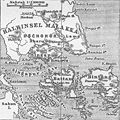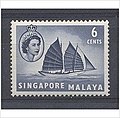Portal:Singapore
 Map of Singapore Singapore, officially the Republic of Singapore, is an island country and city-state in Southeast Asia. The country's territory comprises one main island, 63 satellite islands and islets, and one outlying islet. It is about one degree of latitude (137 kilometres or 85 miles) north of the equator, off the southern tip of the Malay Peninsula, bordering the Strait of Malacca to the west, the Singapore Strait to the south along with the Riau Islands in Indonesia, the South China Sea to the east, and the Straits of Johor along with the State of Johor in Malaysia to the north.
Singapore's history dates back at least eight hundred years, having been a maritime emporium known as Temasek and subsequently a major constituent part of several successive thalassocratic empires. Its contemporary era began in 1819, when Stamford Raffles established Singapore as an entrepôt trading post of the British Empire. In 1867, Singapore came under the direct control of Britain as part of the Straits Settlements. During World War II, Singapore was occupied by Japan in 1942 and returned to British control as a separate Crown colony following Japan's surrender in 1945. Singapore gained self-governance in 1959 and, in 1963, became part of the new federation of Malaysia, alongside Malaya, North Borneo, and Sarawak. Ideological differences led to Singapore's expulsion from the federation two years later; Singapore became an independent sovereign country in 1965. After early years of turbulence and despite lacking natural resources and a hinterland, the nation rapidly developed to become one of the Four Asian Tigers. As a highly developed country, it has one of the highest PPP-adjusted GDP per capita in the world. It is also identified as a tax haven. Singapore is the only country in Asia with a AAA sovereign credit rating from all major rating agencies. It is a major aviation, financial, and maritime shipping hub and has consistently been ranked as one of the most expensive cities to live in for expatriates and foreign workers. Singapore ranks highly in key social indicators: education, healthcare, quality of life, personal safety, infrastructure, and housing, with a home-ownership rate of 88 percent. Singaporeans enjoy one of the longest life expectancies, fastest Internet connection speeds, lowest infant mortality rates, and lowest levels of corruption in the world. It has the third highest population density of any country in the world, although there are numerous green and recreational spaces as a result of urban planning. With a multicultural population and in recognition of the cultural identities of the major ethnic groups within the nation, Singapore has four official languages: English, Malay, Mandarin, and Tamil. English is the common language, with exclusive use in numerous public services. Multi-racialism is enshrined in the constitution and continues to shape national policies in education, housing, and politics. Singapore is a parliamentary republic in the Westminster tradition of unicameral parliamentary government, and its legal system is based on common law. While the country is de jure a multi-party democracy with free elections, the government under the People's Action Party (PAP) wields widespread control and political dominance. The PAP has governed the country continuously since full internal self-government was achieved in 1959, and holds a supermajority in Parliament. One of the five founding members of ASEAN, Singapore is also the headquarters of the Asia-Pacific Economic Cooperation Secretariat, the Pacific Economic Cooperation Council Secretariat, and is the host city of many international conferences and events. Singapore is also a member of the United Nations, the World Trade Organization, the East Asia Summit, the Non-Aligned Movement, and the Commonwealth of Nations. (Full article...)Selected article -The Changi Murals are a set of five paintings of biblical themes painted by Stanley Warren, a British bombardier and prisoner-of-war (POW) interned at the Changi Prison, during the Japanese occupation of Singapore in the Second World War. His murals were completed under difficult conditions of sickness, limited materials and hardships. With a message of universal love and forgiveness, they helped to uplift the spirits of the POWs and the sick when they sought refuge in the prison chapel. After the war, the walls of the chapel were distempered over, hiding the murals from view. They were forgotten until their rediscovery in 1958. Due to their historical significance, an international search was conducted to locate the original painter to help in restoring the damaged and faded murals. Warren was eventually found in 1959 and, after much persuasion, agreed to assist in the restoration project. He made three trips to Singapore between 1963 and 1988 to restore his former paintings. Because of his advanced age, only four of the original murals were fully restored. In the 1990s, the former site of the murals was gazetted as a Heritage Site by the National Heritage Board of Singapore. (Full article...) Selected picture Saint Joseph's Church on Victoria Street during a Good Friday evening procession. Read more... General imagesThe following are images from various Singapore-related articles on Wikipedia.
Selected biography -Yip Pin Xiu PJG PLY (born 10 January 1992) is a Singaporean backstroke swimmer. She is a six-time Paralympic gold medalist and four-time World Champion, with two world records in the 50 m backstroke S2 and the 100 m backstroke S2. Yip is Singapore's most decorated Paralympian and Southeast Asia's most decorated swimming Paralympian. She has Charcot-Marie-Tooth syndrome and competes in the S2 category for the physically impaired. Since 2005, she has won medals in international competitions such as the World Wheelchair and Amputee Games, Japan Paralympic Swimming Championships and International German Paralympic Swimming Championships. At the 2008 Summer Paralympics, she won a gold medal in the 50 metres backstroke and a silver medal in the 50 metres freestyle, setting world records in both events. At the 2016 Summer Paralympics, she won a gold medal in the 100 metres S2 backstroke, setting a world record for that event, and another for her 50 m split. She retained her gold medals for these two events in 2020 and 2024 in a historic three-peat. (Full article...) Did you know (auto-generated)
In this month
More did you know -
Selected panoramaSungei Serangoon (Malay for Serangoon River; Chinese: 实龙岗河) is a river in the north-eastern part of Singapore. The 6-kilometre river starts as a canal near Tampines Road, and flows through Hougang, Sengkang, Punggol, Lorong Halus and Pasir Ris, before emptying into the Serangoon Harbour. The river is also known as the Serangoon Estuary. Singapore topicsRelated portalsSoutheast Asia Other Countries Tasks
CategoriesWikiprojectsAssociated WikimediaThe following Wikimedia Foundation sister projects provide more on this subject:
Discover Wikipedia using portals |































































